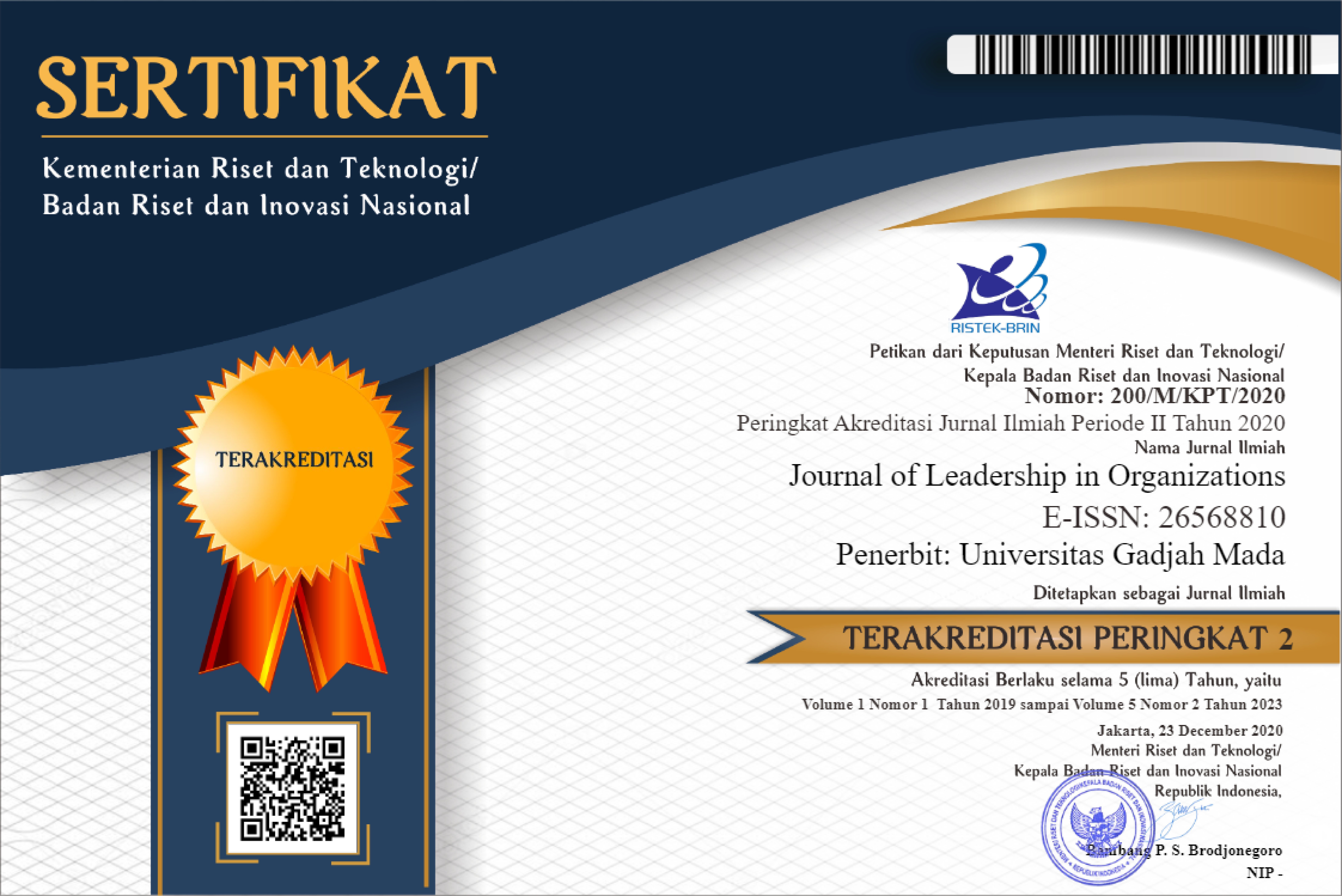THE EFFECT OF ETHICAL LEADERSHIP ON VOICE BEHAVIOR: THE ROLE OF MEDIATORS ORGANIZATIONAL IDENTIFICATION AND MODERATING SELF-EFFICACY FOR VOICE
Utami Tunjung Sari(1*)
(1) Fakultas Ekonomika dan Bisnis Universitas Gadjah Mada
(*) Corresponding Author
Abstract
Some ethical violations that occur in both business organizations and the government in turn highlight the important role of leadership in managing ethical accountability. Ethical leadership arises as a result of various ethical violations and demands for leaders to be able to manage ethical accountability. This study explains the mechanism of influence of ethical leadership behavior on voice behavior in private sector organizations in Indonesia. This study attempts to look at the role of organizational identification as a mediator on the influence of ethical leadership on voice behavior and incorporate the effects of mediation and moderation in one model (moderated mediation model) by using self-efficacy for voice as moderating. Learning theory, social exchange, social identity, and self-efficacy were used as the foundation in this study. 230 valid responses from employees took part in this study. The results of the data analysis showed ethical leadership behavior had a positive influence on voice behavior. Furthermore, organizational identification mediates the influence of ethical leadership on voice behavior and self-efficacy for voice moderating that influence. These findings indicate that employees identified with the organization have a tendency to voice behavior, then employees with high self-efficacy for voice will be more confident in their ability to conduct voice behavior.
Full Text:
PDFReferences
Ashforth, B. E., & Mael, F. A. (1989). Social identity theory and the organisation. Academy of Management Review, 14, 20-39. Ashforth, B. E., Harrison, S. H., & Corley, K. G. (2008). Identification in organizations: An examination of four fundamental questions. Journal of Management, 34(3), 325–374. Avey, J., Wernsing, T., & Palanski, M. (2012). Exploring the process of ethical leadership: The mediating role of employee voice and psychological ownership. Journal of Business Ethics, 107, 21–34. Bandura, A. (1986). Social foundations of thought and action: A social cognitive theory. Englewood Cliffs, NJ: Prentice hall. Bandura, A. 1997. Self-efficacy: The exercise of control. New York: freeman. Brown, M. E., & Trevin˜ o, L. K. (2006). Ethical leadership: A review and future directions. The Leadership Quarterly, 17, 595–616. Brown, M. E., Trevin˜o, L. K., & Harrison, D. A. (2005). Ethical leadership: A social learning perspective for construct development and testing. Organizational Behavior and Human Decision Processes, 97, 117–134 Brown, M. E., & Mitchell, M. S. (2010). Ethical and unethical leadership: Exploring new avenues for future research. Business Ethics Quarterly, 20, 583–616. Cooper, D. R., & Schindler, P. S. (2014). Business Research Methods, (Twelfth Edition). New York, McGraw-Hill Education. Den Hartog, D. N. (2014). Ethical leadership. Annual Review of Organizational Psychology and Organizational Behavior, (2), 409-434. Detert, J. R., & Burris, E. R. (2007). Leadership behavior and employee voice: Is the door really open?. Academy of Management Journal 50 (4), 869–884. Ellemers, N., D. De Gilder and S. A. Haslam (2004). ‘Motivating individuals and groups at work: A social identity perspective on leadership and group performance’. Academy of Management Review, 29, 459–478. Gist, M. E., & Mitchell, T. R. (1992). Self-efficacy: A theoretical analysis of its determinants and malleability. Academy of Management Review, 17(2), 183–211. Hair, F. J., Black, C. W., Babin, J. B., & Anderson, E. R. (2014). Multivariate Data Analysis. London: Pearson Education Limited. Hogg, M. A., and D. J. Terry. 2001. Social Identity and Self-Categorization Processes in Organizational Contexts. Academy of Management Review, 25 (1), 121–140. Huang, L., & Paterson, T. A. (2014). Group Ethical Voice Influence of Ethical Leadership and Impact on Ethical Performance. Journal of Management, 01 (4), 45-69. Janssen, Onne dan Gao, Liping. (2013). Supervisory Responsiveness and Employee Self-Perceived Status and Voice behavior. Journal of Management, 25 (5), 23-45. Kalshoven, K., Den Hartog, D. N., & De Hoogh, A. H. B. (2011). Ethical leadership at work questionnaire (ELW): Development and validation of a multidimensional measure. The Leadership Quarterly, 22, 51–69. Morrison, E. W. (2011). Employee voice behavior: Integration and directions for future research. Academy of Management Annals, 5, 373-412. Morrison, E. W. (2014). Employee voice and silence. The Annual Review of Organizational Psychology and Organizational Behavior, 1, 173-197 Muller, D., Judd, C. M., & Yzerbyt, V. Y. (2005). When moderation is mediated and mediation is moderated. Journal of Personality and Social Psychology, 89, 852-863. Ng, K. Y., Ang, S., & Chan, K. Y. (2008). Personality and leader effectiveness: A moderated mediation model of leadership self-efficacy, job demands, and job autonomy. Journal of Applied Psychology, 93, 733-743. Resick, C., Hargis, M., Shao, P., & Dust, S. (2013). Ethical leadership, moral equity judgments, and discretionary workplace behavior. Human Relations, 66, 951–972. Tyler, T. R. (1997). Why people cooperate with organizations: An identity-based perspective. In R. I. Sutton, & B. M. Staw (Eds.), Research in organizational behavior, 21, 201–246 114 Van Dyne, L., & LePine, J.A. (1998). Helping and voice extra-role behavior: Evidence of construct and predictive validity. Academy of Management Journal, 41, 108–119. Walumbwa, F.O., & Schaubroeck, J. (2009). Leader personality traits and employee voice behavior: Mediating roles of ethical leadership and work group psychological safety. Journal of Applied Psychology, 94,1275–1286. Walumbwa, F. O., Mayer, D. M., Wang, P., Wang, H., Workman, K., & Christensen, A. L. (2011). Linking ethical leadership to employee performance: The roles of leader-member exchange, self-efficacy, and organizational identification. Organizational Behavior and Human Decision Processes, 115, 204–213.
Article Metrics
Refbacks
- There are currently no refbacks.
Copyright (c) 2019 Journal of Leadership in Organizations
| Journal of Leadership in Organizations |
| Journal of Leadership in Organizations (JLO), with registered number ISSN 2656-8829 (Print) and ISSN 2656-8810 (Online), is published by the Center for Leadership Studies, Department of Management, Faculty of Economics and Business, Universitas Gadjah Mada. The content of this website is licensed under a Creative Commons Attribution-ShareAlike 4.0 International License |
| © 2019 Journal of Leadership in Organizations | |





_logo2.png)


.png)




